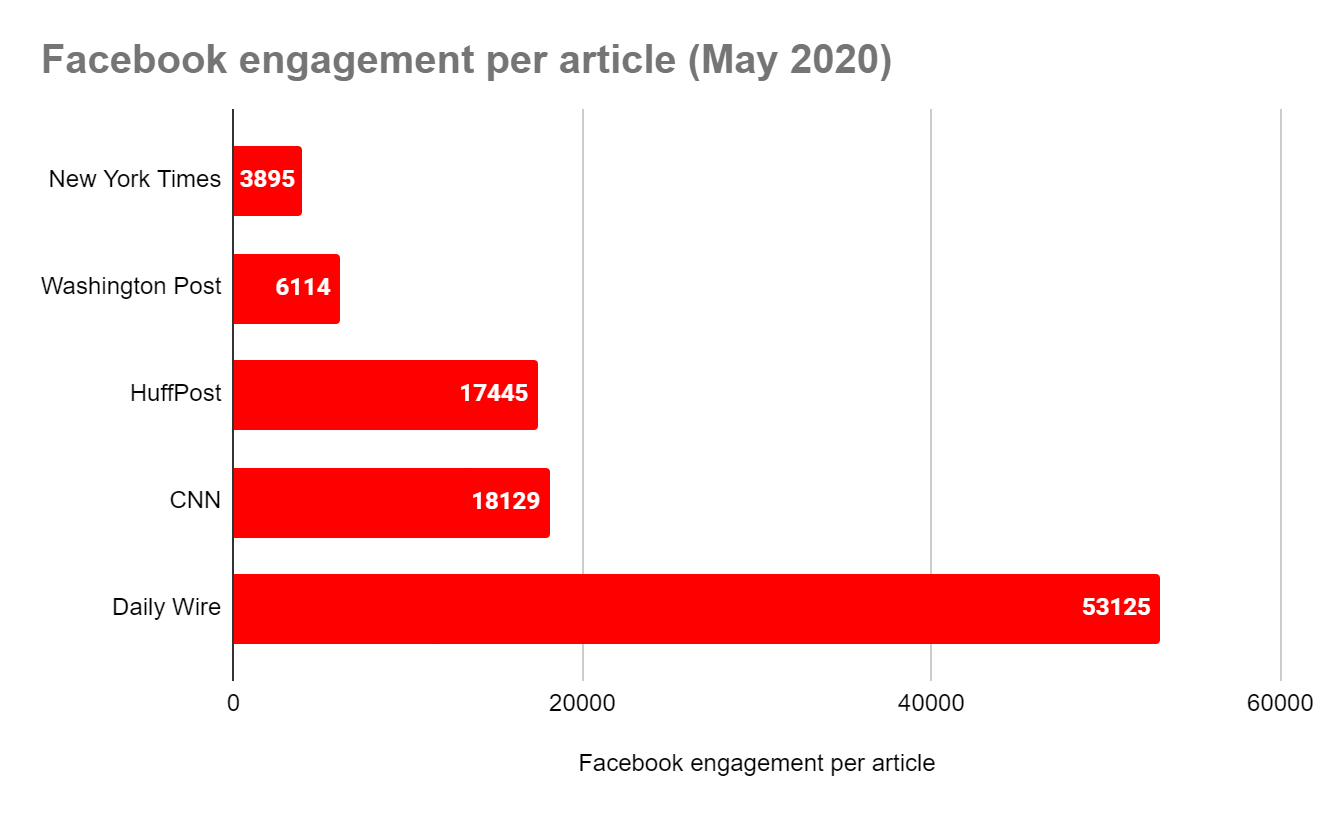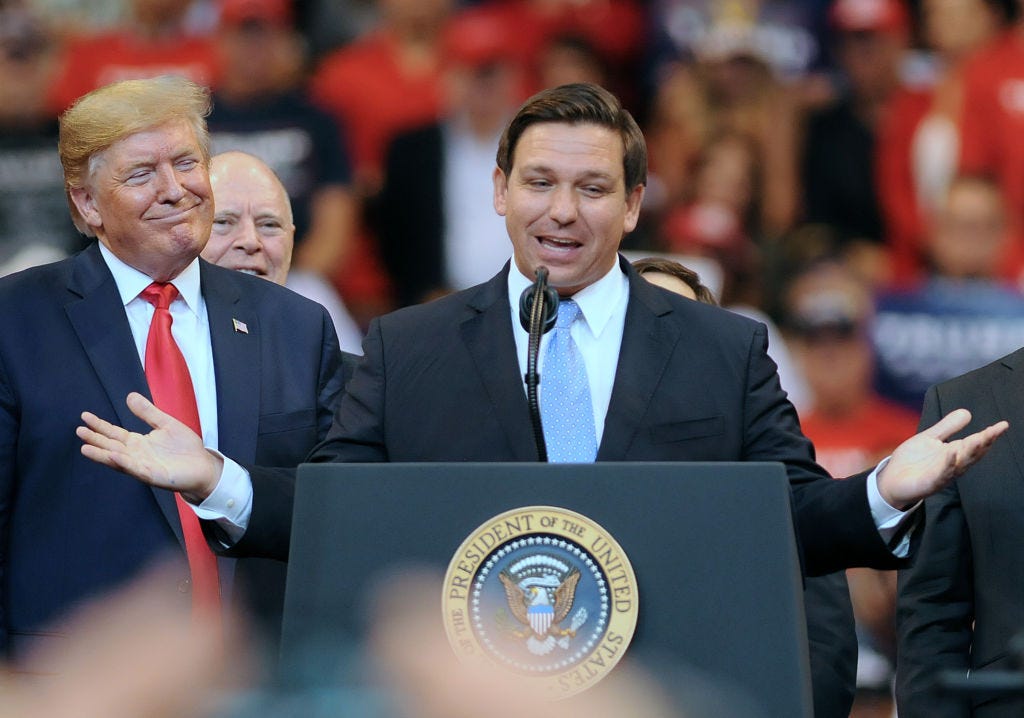DeSantis, Big Tech, and the future of Trumpism
Trump, out of office and booted from major social media platforms, has receded from the spotlight. But many of Trump's closest allies remain in powerful positions and have elections around the corner. How do they keep Trump's biggest fans, the Republican base, engaged?
This week, Florida Governor Ron DeSantis (R), who is up for reelection in 2022, provided a roadmap. It does not involve dealing with the state's $2.7 billion revenue shortfall or the raging pandemic that has already killed 27,000 Floridians. In a lengthy press conference, DeSantis announced state legislation designed to crack down on Big Tech for their alleged bias against conservatives.
DeSantis blasted the "oligarchs in Silicon Valley" for "censorship over individuals and organizations" and "clear viewpoint discrimination." In case anyone missed the point, DeSantis "specifically cited Twitter’s decision to permanently suspend Trump from its platform as a reason why his proposal was vital."
The proposed legislation, which has not yet been drafted, "would prohibit companies from suspending the account of a political candidate and be subject to a fine of $100,000 for each day the account of a statewide candidate is blocked, or $10,000 a day for other office-seekers." The bill, according to DeSantis, will also allow individuals and "Florida Attorney General Ashley Moody to sue companies under the state’s unfair and deceptive trade practices law for punishing individuals for content they post."
DeSantis says all this is necessary because when Big Tech companies moderate content, "the thumb’s always on the scale in one direction." DeSantis claims that he receives threats online, but they are not removed by social media companies because he's a Republican.
While DeSantis' proposal will please Trump and may prove an effective political strategy, it suffers from two major issues. First, it is trying to solve a problem that doesn't exist. And second, it is unconstitutional.
Social media companies are not biased against conservatives
Social media companies have lots of problems — they spread dangerous misinformation, incubate violent extremists, and violate their users' privacy. But they are not biased against conservatives.
An NYU study published this week concluded "there are no empirical studies that definitively assess the claim of anticonservative bias." But "there are a variety of analyses and rankings that indicate that conservatives enjoy a prominent place on major social media platforms." According to data from Crowdtangle, a social media analytics service owned by Facebook, "right-leaning U.S. Facebook pages dominate the list of sources producing the most-engagedwith posts containing links." A page operated by Dan Bongino, a far-right commentator, "outperformed those of most major news organizations."
An October 2020 studyby Politico and the Institute for Strategic Dialogue found "[r]ight-wing social media influencers, conservative media outlets and other GOP supporters dominate online discussions around two of the election’s hottest issues, the Black Lives Matter movement and voter fraud." The study examined millions of Facebook posts, Instagram feeds, Twitter messages, and conversations on Reddit and 4Chan.
Popular Information has documented how social media platforms, particularly Facebook, caters to the right wing. A May 2020 analysis found that The Daily Wire, a right-wing outlet founded by conservative commentator Ben Shapiro, vastly outperformed every mainstream media outlet on a per article basis.
Popular Information discovered "a network of large Facebook pages — each built by exploiting racial bias, religious bigotry, and violence — that systematically promote content from The Daily Wire." Popular Information later established that The Daily Wire, in violation of Facebook's rules, was paying the network, known as Mad World News, to post its content. Facebook acknowledged the undisclosed relationship violated its rules, and punished Mad World News. But it let The Daily Wire off with a "warning."
Facebook's powerful DC office, which is in charge of public policy issues, is run by a group of Republican operatives. Joel Kaplan, who runs the office, routinely advocates for right wing publishers and politicians on Facebook. "Any time there was an issue with Breitbart or Daily Caller, Joel made the decision, and he always acted to protect them," a former Facebook employee told Popular Information in 2019.
In 2019, in response to claims of conservative bias, Facebook enlisted former Senator Jon Kyl (R-AZ) to conduct an audit of the company. Kyl released an eight-page report repeating a litany of allegations from more than 100 conservative politicians and organizations. But Kyl did not identify any evidence of bias against conservatives.
It's not constitutional to force companies to publish content
DeSantis claims his bill is about protecting First Amendment rights. But the First Amendment prohibits the government from interfering with the speech right of private entities. And that's precisely what DeSantis' legislation would do.
"Governor DeSantis’ proposal is neither novel nor constitutional. It raises the same issue as a previous Florida law which required newspapers that criticized a political candidate to publish that candidate’s response," attorney Ari Cohn told Law & Crime.
That law was taken up by the Supreme Court in the 1974 case of Miami Herald v. Tornill. The Supreme Court determined that requiring a private entity to publish certain content violated its First Amendment rights:
The Florida statute operates as a command in the same sense as a statute or regulation forbidding appellant to publish specified matter… Even if a newspaper would face no additional costs to comply with a compulsory access law and would not be forced to forgo publication of news or opinion by the inclusion of a reply, the Florida statute fails to clear the barriers of the First Amendment...
DeSantis' legislation would force Facebook, Twitter, or any other social media outlet to publish content from candidates. Even if those candidates, like Trump, was advocating violence or using misinformaiton to suppress votes. Under the precedent of Miami Herald v. Tornill that forced political speech would be a violation of the First Amendment.
"The state of Florida could no more fine Facebook for refusing to host a racist or fascist politician than it could force a newspaper to publish an op-ed by that politician," Chip Stewart, a media law professor at TCU, said. Stewart called DeSantis' proposal "hillariously unconstitutional."





Ron DeSantis is a jackass. Truly. There must be something in the water in that state, because it has also given us the execrable Matt Gaetz.
I live in Florida, & believe me, Ron DeSantis isn’t known for his intellectual thinking. He is a Trump syncopant. His last election was close, & I hope that the Democrats can come up with someone who can beat him, but I’m doubtful, as Florida leans Republican. There are still Trump signs around town, because apparently some people don’t realize that the free and fair election is over.
DeSantis has made a deal with Publix to distribute the coronavirus shots. Publix donated $100,000 to DeSantis. Coincidence? Trying to get an appointment is like trying to win the lottery, you have to log on at a certain time, along with everybody else who wants a shot. At the present time I can’t preregister. Frustrating.